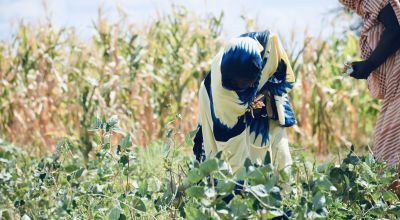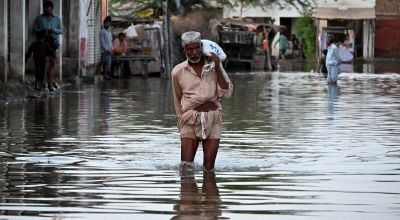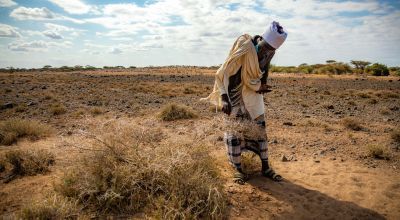
Read our 2024 annual report

Knowledge Hub
While many speak of climate change as something that will affect us in the future, the reality is that it is having a devastating impact on many communities today.
Climate change remains one of the defining challenges of our generation and we all still have to opportunity to address our own behaviour and do our part to reach the Sustainable Development Goals (SDGs) by 2030. Small changes can make a big impact and, in this blog, we’ll look at some of the innovative programmes that are already moving things in the right direction.
Here are some simple ways we can all help stop the climate crisis.
What impact can climate change have on our lives?
The current climate crisis means that weather events such as floods, droughts and even locust outbreaks are becoming more and more frequent. Millions of people across the globe are completely dependent on their crops in order to feed their families but when these fail due to extreme weather, they are left with nothing to eat and fighting to survive.
At Concern, we work with these communities to distribute essentials such as food supplies but we also teach alternative farming methods and advise on crops so that they can build their resilience and be better prepared for the future.
According to the Environmental Protection Agency, climate change will have several major impacts on countries like Ireland. including more intense storms and rainfall events, more frequent and intense river and coastal flooding, effects on water quality and a rise in sea levels. If temperatures continue to rise, coastal towns like Sandymount, Portmarnock, Malahide and Howth will experience marine booms according to a report from the Intergovernmental Panel on Climate Change (IPCC).
What’s currently being done to stop climate change?
Climate change is currently being tackled on an individual and institutional level, in both preventative and reactive ways.
There are many easy ways that we, as individuals, can help work to prevent climate change. The pandemic has seen many of use reduce our carbon footprint by cutting out international travel but there are many other steps that you can take, such as reducing waste, shopping smarter and recycling.
Reactive ways to show your environmentalism include volunteering for community clean-ups, lobbying for greener infrastructure and supporting organisations helping those affected by climate change.
When it comes to institutional climate action, governments and organisations around the world are waking up to the reality of the climate crisis. In May 2019, Ireland became the second country in the world to declare a climate emergency, and many countries have since followed suit.
There are also many organisations working to address climate change in different ways, including NGOs like Concern who are working hard to help those whose lives are already affected by climate change, despite those people being least responsible for it. We do this by educating on climate smart forms of agriculture, which help to boost the fertility of semi-arid lands. We also provide therapeutic food for those who are trying to survive with no plant or meat-based nourishment.
There are also several advocacy groups lobbying for environmental action, such as Stop Climate Chaos and Friends of the Earth Ireland who are always looking for new members.

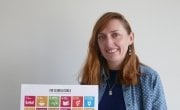

How can I reduce my "carbon footprint"?
According to the World Health Organisation (WHO), a carbon footprint is a measure of the impact your activities have on the amount of carbon dioxide (CO2) produced through the burning of fossil fuel, and is expressed as a weight of CO2 emissions produced in tonnes.
Simply put, it is the amount of carbon dioxide released into the atmosphere as a result of the activities of a particular individual, organisation or community.
Here are three simple but effective ways you can reduce yours.
Eat less meat
Stop eating meat or at least drastically reduce it in your diet. While this might sound daunting for some, it has become significantly easier in recent years, with a variety of meat substitutes coming to the market.
Eat more plants
A special report on climate change and land by the Intergovernmental Panel on Climate Change (IPCC) describes plant-based diets as a major opportunity for mitigating and adapting to climate change. Vegan and vegetarian options are now plentiful in almost every good restaurant and café, and there are many pages and groups online sharing tasty and filling recipes.
Make small household changes
When it comes to environmentalism in the home, simple things like unplugging devices not in use can make a big difference. In the United States of America alone, so-called ‘vampire power’ is responsible for draining up to $19 billion in energy every year. Ending overnight charging habits can not only fight against climate change, but it will also reduce your bills and reduce any fire risks due to faulty wires.

How can I reduce my rubbish pile?
Did you know that the average Irish household throws out just under one tonne of rubbish each year? Currently, only around 50% of this is recycled. According to StopFoodWaste, this means that each household is still throwing half a tonne of rubbish into landfill each year - that’s 800,000 small cars worth of rubbish landfilled annually.
Furthermore, of the waste that goes to landfill, almost 40% is organic waste and the majority of this is food waste.
There are so many ways to cut down on this waste. One of the simplest is to cut down on our buying. This can be done by having our shopping lists when going shopping. This cuts down on impulse purchases and ensures that everything you buy is something you need.
If you do happen to bulk buy, consider making batch meals and using your freezer to keep them fresh for longer. If planning to freeze meat or fish, be sure to check instructions on whether they are safe to freeze.
Since some food waste is inevitable, starting to compost is an easy but impactful way to curtail food waste.
Composting is an aerobic method of decomposing organic solid wastes. It can therefore be used to recycle organic material. No matter whether you are in an urban or rural setting, composting is possible. Fruit and vegetables are all compostable, as are eggshells, ground coffee and some tea bags. Meat of any kind is not compostable. More information on composting can be obtained from Citizens Information.
Do I need to save water?
According to research by Behaviour & Analysis conducted on behalf of Irish Water, just over half of the Irish public have said that they waste water and 25% said they don’t believe they need to conserve water because of how often it rains in Ireland.
Around 71% of the planet is covered by water, but only one per cent is available to us as drinking water. Although there is enough annual rainfall in Ireland, only a limited amount can be treated and used by communities. It is our responsibility to ensure that we sustainably and respectfully conserve our clean water.
There are lots of easy ways to tackle water wastage. One of them is to keep showers under five minutes. While long hot showers may be nice, they (along with baths) should be considered a luxury.
2020 showed just how important handwashing and good hygiene is, but it is not necessary to leave taps running while brushing teeth. You can save up to 20 litres per day just by turning off the tap when you are brushing your teeth or washing your hands or face.
Also, did you know that you can save up to 700 litres of water each year by installing a water-saving toilet flush system? Standard, old-fashioned toilets use around five to seven gallons per flush. These new systems are becoming increasingly popular in North America as an easy way to save on water.
How does recycling help stop climate change?
By reusing and recycling, we ensure that the world’s natural resources are saved. By recycling paper and wood, trees and forests are spared. By recycling plastic, less non-decomposable plastic is created. Recycling glass reduces the need to use new raw materials.
If items aren’t recycled or disposed of properly, they can end up polluting the world’s oceans, threatening ecosystems that are already at risk. It’s estimated that at least 14m tonnes of plastic pieces less than 5mm wide are likely sitting at the bottom of the world’s oceans.
Recycling reduces the need to harvest or remove new raw materials from the Earth. This eases the harmful disruption and damage being done to the natural world. It means that fewer forests are cut down, rivers diverted and natural habitats for wild or endangered animals destroyed.
It is amazing to think that such small household decisions can have such a profound and lasting impact on our planet.
This list shows all domestic items that can be recycled.
How to stop climate change in the ocean?
As mentioned in the previous section, the world’s oceans are laden with plastics and other kinds of human waste. Due to the enormity of issues like pollution, climate change and overfishing, it can feel like individuals can’t make a difference. However, as we saw from Greta Thunberg’s climate activism of 2019, one person can make a big difference.
Naturally, our choices at home can make a big difference when preventing any further ocean pollution. Avoiding products containing pollutants is a good way to start. We can also choose non-toxic chemicals and dispose of herbicides, pesticides and cleaning products in a more sustainable manner. But what about all those pollutants already in the ocean?
Organisations like the World Wildlife Fund are dedicated to ending plastic pollution in the world’s oceans. They even have a global petition that can be customised to your government, depending on which country you are living in.
If your community has an environmental committee, joining and participating in that could help litter landing through sewers and rivers. Every action that could be considered little or local can help make a difference in vast oceans.
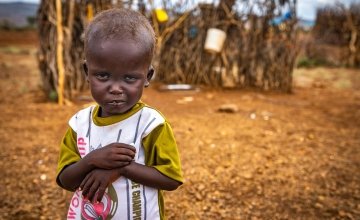
How to stop climate change in the rainforest?
From the air we breathe right down to the wood we use, forests are absolutely essential to our lives. Tropical rainforests are often called the ‘lungs of the planet’ for a very good reason - they draw in carbon dioxide and breathe out oxygen. However, in many cases, the ‘lungs of the planet’ are on fire and it can be hard to see what we can do when we live thousands of miles away from them.
One of the main ways to save the rainforests is to keep informed. If you regularly check in with trusted news sources, you can share vital updates with your friends and family on social media. You can even encourage your preferred news outlet to cover rainforest news by emailing the editor.
Similar to improving your carbon footprint, consumer habits can have a big effect on deforestation. Choosing products that are responsibly sourced or made from recycled materials can go a long way to saving vital rainforests. Search online to see if any household items you regularly buy are grown on deforested land or if any ingredients, such as palm oil, are main drivers of deforestation.
When buying food and drink, it’s also best to choose companies that are Fairtrade certified or that give back to charities. This offers an alternative and effective way to protect rainforests, but also the sustainable livelihoods of the people who call them home.
How to stop climate change: A look at different countries
Many countries around the world have made tackling climate change a high priority, while others have much to do.
As of January 2021, 194 states and the European Union have signed the Paris Agreement, which is a landmark international accord adopted to address climate change and its negative impacts.
Let’s take a look at the progress that countries around the world are making in rectifying climate issues.
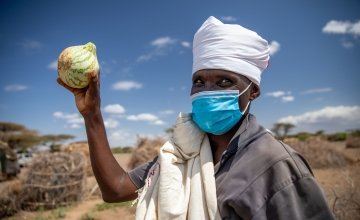
Ireland
As previously mentioned, Ireland was the second country in the world to declare a climate emergency after pressure for grassroots lobbying groups. In 2020, Government published the draft text for the Climate Action and Low Carbon Development (Amendment) Bill which will set the country on course to become climate neutral by 2050. Ireland has also signed up to the United Nations Framework Convention on Climate Change and its Kyoto Protocol.
In 2019, the then Government launched its Climate Action Plan, which set out ambitious targets to fight climate change and achieve net zero greenhouse gas emissions by 2050. It states that by 2030, Ireland will have 70% of all electricity generated to be from renewable sources, 950,000 electric vehicles on the road, that all plastic packaging should be reusable or recyclable and much more.
Climate change is one of the core topics of Project Us, Concern’s movement for change in Ireland. It is a space for communities to gather together to discuss the global and local issues that matter to them. It explores how issues at local level connect to the UN’s Global Goals, the international pathway towards creating a more equal world by 2030. It is a unique forum for the people of Ireland, to share ideas, raise our voices and connect.
United Kingdom
In May 2019, the UK became the first country to declare a ‘climate emergency’, which was the result of a motion called by the Labour Party. It was followed by the release of a report from an advisory committee to the UK government that urged it to set a target of getting to ‘net-zero’ greenhouse gas (GHG) emissions by 2050.
However, the Committee on Climate Change states that the UK has fallen behind in progress to tackle and prepare for climate change, highlighting that the global average temperature has already risen by around 1°C since pre-industrial levels and climate risks are increasingly apparent.
Bangladesh
Bangladesh is particularly vulnerable to climate change, due to its low elevation, high population in urban areas and inadequate infrastructure. According to Environmental Justice Foundation, it has been estimated that by 2050, one in every seven people in Bangladesh will be displaced by climate change, with up to 18 million people having to move because of rising sea levels alone. In the 2020 edition of Germanwatch's Climate Risk Index, it ranked seventh in the list of countries most affected by climate calamities during the period 1999–2018.
To address the sea level rise threat in Bangladesh, the Bangladesh Delta Plan 2100 was launched in 2018 and contains six main goals including ensuring safety from climate change related disasters; enhancing water security; ensuring sustainable and integrated river systems; conserving wetlands and ecosystems; developing effective governance for water resources management; and achieve optimal use of land and water resources.
At Concern, our teams are helping people living in poverty in Bangladesh to build resilience and we better prepared for any future weather events. We are doing this by establishing programmes which will reduce poverty, respond to emergencies and improve health and nutrition.
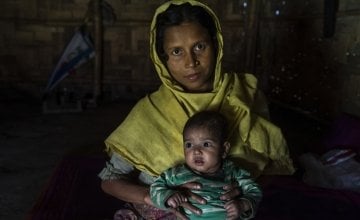
Canada
The Canadian Government has announced plans to ban harmful single-use plastic items, such as bags and straws. Every year, Canadians throw away three million tonnes of plastic waste, only nine per cent of which is recycled, meaning the vast majority of plastics end up in landfill and about 29,000 tonnes finds its way into Canada’s natural environment.
A key part of the plan to address this is the ban on harmful single-use plastic items are found in the environment, are often not recycled, and have readily available alternatives. Based on those criteria, the six items the Government proposes to ban are plastic checkout bags, straws, stir sticks, six-pack rings, cutlery, and foodware made from hard-to-recycle plastics.
In Canada, up to 15 billion plastic bags are used every year and close to 57 million straws are used daily so this could have a significant impact. Regulations will be finalised by the end of 2021.
Pakistan
Pakistan is the fifth most climate vulnerable nation in the world. According to the Global Climate Risk Index, the country is estimated to have lost nearly 10,000 lives to climate-related disasters between 1998 and 2018.
Around 44% of children under five years of age in Pakistan are chronically malnourished and displacement of the population due to insecurity and natural disasters has been a major humanitarian concern for the past several years.
The Pakistan Government has been working to promote electric energy and mobility to reduce overall emissions and improve air quality in urban areas. It has also cancelled plans for two coal power projects and is trying to generate 30% of total electricity through renewable means in the coming years.
The Ministry of Climate Change in Pakistan has also launched the ‘Billion Tree Honey initiative’, which hope to provide green jobs, protect the country’s expanding forests and also sustainably enhance Pakistan export revenues.
Concern has responded to all the major disasters since 2009, reaching millions of beneficiaries in Pakistan. During 2019, Concern also continued work on the second phase of the DFID-funded Building Disaster Resilience Programme, strengthening community and household resilience to emergencies in disaster-prone districts and mitigating the impact of drought and earthquakes in addition to flood-prone areas.
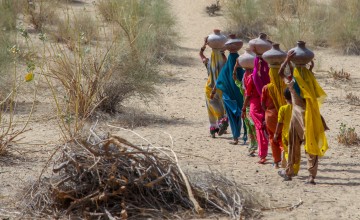
How to stop climate change the easy way
One of the easiest ways to do your part in addressing the impact of climate change is to support relevant organisations and charities. A small monthly donation can make a big difference to people living in some of the poorest parts of the world, where climate change is already severely affecting lives.
Concern promotes Climate Smart Agriculture across many of the countries in which we work, particularly in areas around the Sahel and Horn of Africa where frequent drought leaves people at risk of losing their livestock, their livelihoods and even their lives.
Another easy way to help stop climate change is to be smart with your consumer purchasing habits and strive to live sustainably. Here are some simple ways to make a difference:
- Make shopping lists
- Cut down on meat
- Buying ethical brands
- Keep informed on climate change policies or inactions by your government
- Ensure you are getting your news from a trusted source
- Lobby your local representatives to keep climate change on the agenda
What are organisations that help stop climate change?
Concern partners with a number of reputable organisations around Ireland that do their best to fight climate change on a local, national and international level. Here are just a few of them:
Stop Climate Chaos is a coalition of civil society organisations campaigning to ensure Ireland does its fair share to tackle the causes and consequences of climate change.
National Youth Council of Ireland:
NYCI is the representative body for voluntary youth organisations in Ireland. It uses collective expertise to act on issues that impact on young people.
Coalition 2030 is an alliance of civil society organisations working together to ensure Ireland keeps its promise to achieve the Sustainable Development Goals (SDGs), both at home and abroad.
Fairtrade is an alternative approach to conventional trade and is based on a partnership between some of the most disadvantaged farmers and workers in the developing world and the people who buy their products. Fairtrade Ireland works to promote fair trading practices between Ireland and developing countries.
What's next?
At Concern, we are doing what we can to support vulnerable populations whose lives are already being put in danger by warming temperatures across the globe, and helping them to build resilience for the future.
Other ways to help
Corporate support
Is your company interested in working together for a common cause?
Fundraise for Concern
From mountain trekking to marathon running, cake sales to table quizzes, there are lots of ways you can support our work.
Buy a gift
With an extensive range of alternative gifts, we have something to suit everybody.
Leave a gift in your will
Leave the world a better place with a life-changing legacy.
Volunteer with Concern
The lots of ways to get involved with our work as a volunteer
School fundraising
Without the generous support from schools, we wouldn't be able to do the work that we do.


